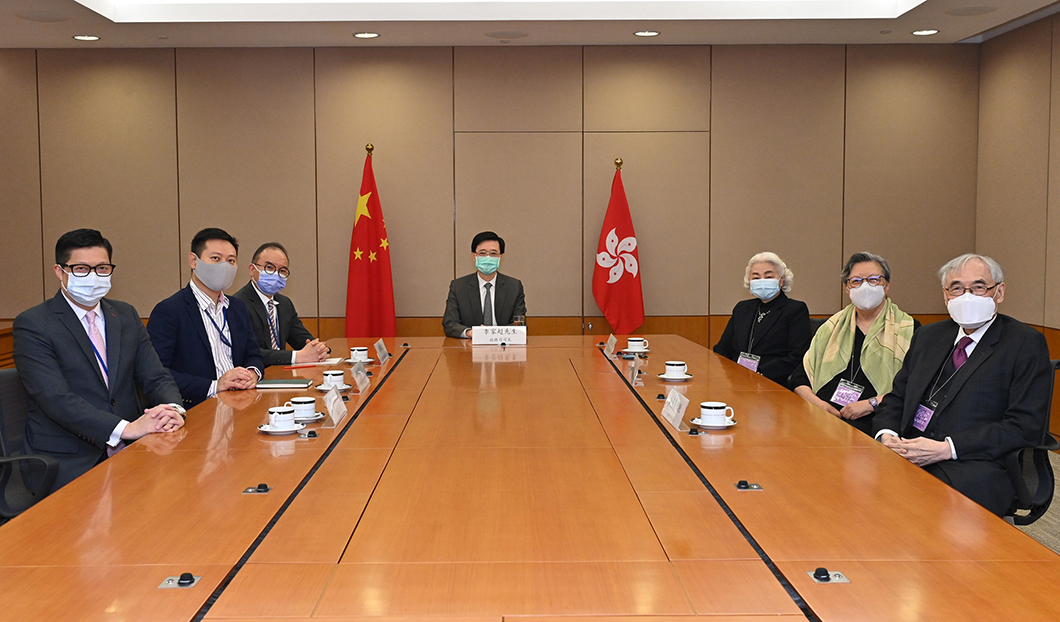Candidate Eligibility Review Committee reviews candidacy in accordance with the law to ensure “patriots administering Hong Kong”
17 July 2021
Hong Kong is gearing up for three key elections in the coming eight months. By virtue of the newly amended Annex I and Annex II to the Basic Law and the corresponding local legislation, the Candidate Eligibility Review Committee (CERC) was established and commenced operation on July 6, with its first meeting held on July 14.
Tasked with reviewing and confirming the eligibility of candidates in the Election Committee (EC), the Chief Executive (CE) and the Legislative Council (LegCo) elections, the CERC will decide whether a candidate complies with the legal requirements and conditions of upholding the Basic Law of the Hong Kong Special Administrative Region (HKSAR) of the People’s Republic of China (PRC) and bearing allegiance to the HKSAR of the PRC. In its decision-making process, the CERC may consult the Committee for Safeguarding National Security of the HKSAR (National Security Committee).
“Upholding the Basic Law and bearing allegiance to the HKSAR” are the fundamentals required of a candidate. To expressly define the relevant legal requirements and conditions, the meaning of a reference to “upholding the Basic Law and bearing allegiance to the HKSAR” has been added to the Interpretation and General Clauses Ordinance, Chapter 1 of the Laws of Hong Kong, stipulating that the meaning of “uphold” shall include “intend to genuinely and truthfully observe, support, maintain and embrace, and genuinely and truthfully observe, support, maintain and embrace in words and deeds”. The newly added provisions, which took effect upon gazettal on May 21, consist of a positive list and a negative list. The latter prescribes that a person does not “uphold the Basic Law and bear allegiance to the HKSAR” when the person does, or intends to do, any of the following:
- commits acts or carries out activities that endanger national security, including—
- commits an act required by Article 23 of the Basic Law to be prohibited;
- commits an offence under the Law of the PRC on Safeguarding National Security in the HKSAR (National Security Law); and
- commits an offence relating to endangering national security under an enactment or under the common law;
- refuses to recognise the PRC’s sovereignty over the HKSAR and the exercise of the sovereignty, including objecting to the performance of duties and functions by the body of central power in accordance with the Constitution of the PRC, the Basic Law or the National Security Law;
- refuses to recognise the constitutional status of the HKSAR as a local administrative region of the PRC;
- advocates or supports “Hong Kong independence”, including—
- pursues, promotes or implements “independence and state-building” of Hong Kong;
- participates in an organisation the object of which is “Hong Kong independence”;
- pursues, promotes or implements an activity for “self-determination of sovereignty or jurisdiction”, “referendum” or “devising constitution by all people”, or participates in an organisation the object of which is “self-determination”; and
- pursues or promotes the reign over Hong Kong to be transferred to a foreign country;
- solicits interference by foreign governments or organisations in the affairs of the HKSAR;
- commits acts that undermine or have a tendency to undermine the order of the political structure led by the CE, contained in the Basic Law, including—
- compels or overawes the CE by any unlawful means to change a policy, or a motion to be submitted to the LegCo for consideration;
- indiscriminately objects to the HKSAR Government’s motion, and with this intends to threaten the HKSAR Government, render the HKSAR Government incapable of performing its duties and functions as normal or force the CE to step down and to overthrow the HKSAR Government; and
- makes use of an election held by the HKSAR Government to organise or implement, or to incite another person to organise or implement, a “de facto referendum” in any form to confront the Central People’s Government and the HKSAR Government;
- commits acts that undermine or have a tendency to undermine the overall interests of the HKSAR;
- desecrates the national flag or national emblem, or regional flag or regional emblem, by publicly and wilfully burning, mutilating, scrawling on, defiling or trampling on it; and
- insults or disrespects the national anthem or any other symbol and sign of national sovereignty.
The list provides a clear guidance and serves as the basis for CERC’s reviews. Before making a decision, the CERC will give a holistic deliberation to all the facts, evidence and circumstances pertaining to each individual case without limiting to the acts stipulated in the list and may consult the National Security Committee when necessary. The National Security Committee will, based on the assessment made by the national security department of the Hong Kong Police Force, issue to the CERC an opinion on whether a candidate complies with the legal requirements and conditions of upholding the Basic Law and bearing allegiance to the HKSAR.
Speaking at the thematic forum held by the Chinese Association of Hong Kong and Macao Studies yesterday, Mr Xia Baolong, Vice-Chairman of the National Committee of the Chinese People’s Political Consultative Conference and Director of the Hong Kong and Macao Affairs Office, called for strict gatekeeping in candidacy reviews to ensure the effective running of the city’s three upcoming elections. Indeed, the elections for the new term of EC members, the seventh-term LegCo members and the sixth CE of the HKSAR will have an important bearing on the full implementation of “One Country, Two Systems” and “patriots administering Hong Kong”. I, together with all CERC members, will perform the key role as a gatekeeper by reviewing and confirming candidates’ eligibility in accordance with the law and in a fair and just manner. This will not only ensure the accurate implementation of our electoral revamp, but also achieve the desired effect of ruling out those “faking upholding” and “faking allegiance” from our governance structure.


